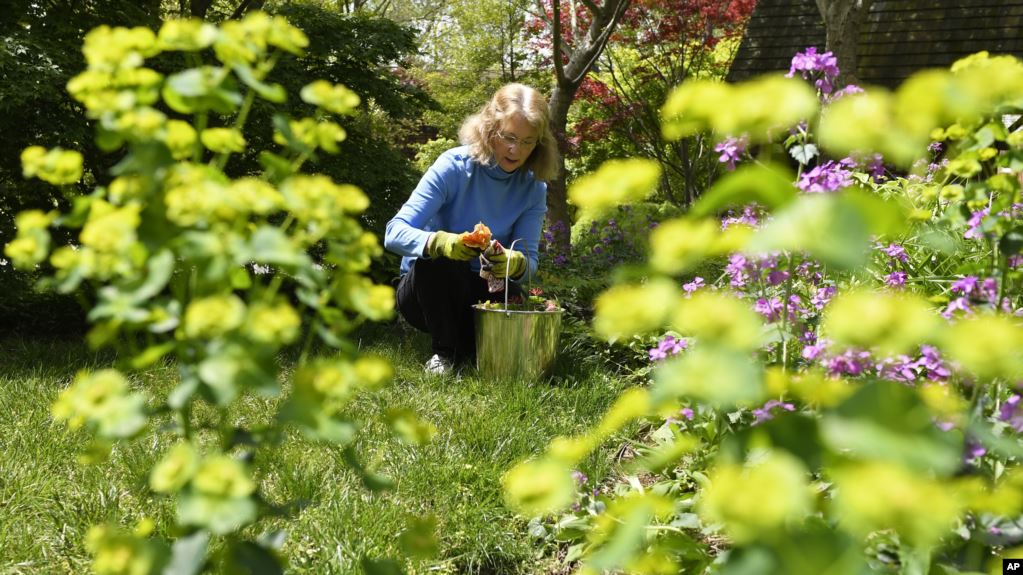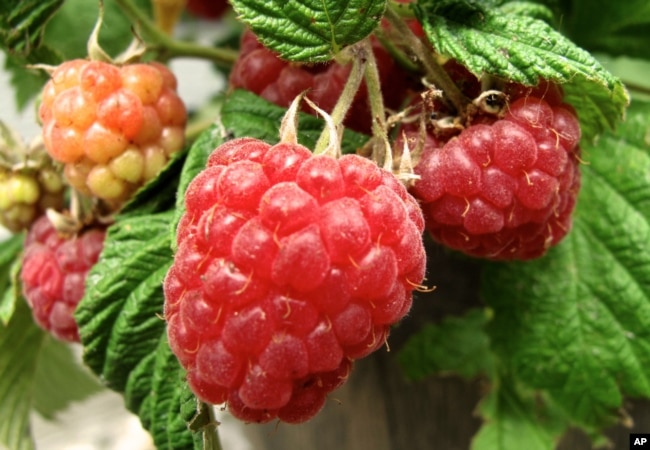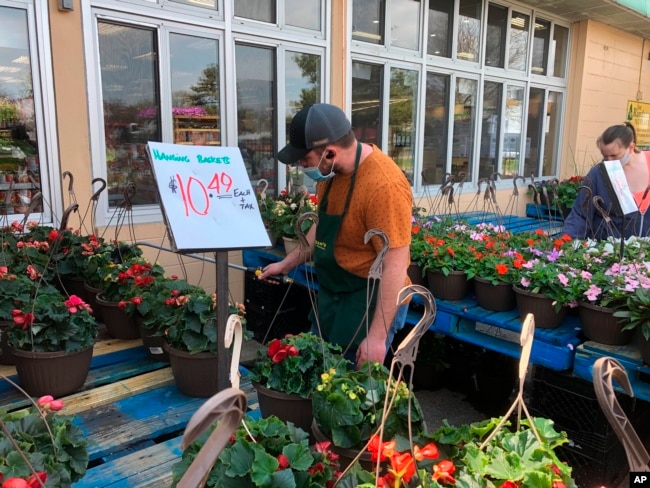
https://learningenglish.voanews.com/a/fight-tension-boredom-with-a-container-garden/5401518.html
From VOA Learning English, this is the Health & Lifestyle Report.
Research shows that growing fruits, vegetables and other plants can make us happier and relieve tension. Working with dirt and plants can be fun. Also, when we garden, we are outside, getting sunshine, fresh air and exercise.
Best of all – a garden gives us healthy fruits and vegetables to feed our families. This can increase our sense of independence. Every time we bite into a sweet tomato or a fresh green bean, we can say happily, “I grew this!”
That’s right. But not all of us have space, time or money for a large garden.
Well, you can garden in small spaces with containers. Container gardening is an easy way to grow vegetables when you lack the space. Even on a balcony or rooftop, you can still garden in containers.
If you do not have money to buy containers, look around your home or neighborhood. You can start your garden in just about anything. Do you have buckets, baskets, cloth bags or boxes? You can use all of them!
Research your location.
Before starting, decide on a place. How much sunlight will it get? Do you have safe access to a rooftop? Is it protected from the wind? Are you able to easily water the plants? All these things are important.
Pick the right plants.
In your containers, you can control the soil and the amount of water, but not the sunlight. So, find out which plants can grow in the light conditions you have.
The website Gardeners.com says that most vegetables need at least six hours of sunlight every day or full sun. However, some plants can grow in partial shade. This means direct sunlight for about three to six hours.
Here is a rule of thumb: If you eat the fruit or root of the plant, it needs full sun. This includes tomatoes, eggplant, peppers, squash, potatoes or carrots.
If you eat the leaves, it can grow in partial sun. This includes broccoli, cauliflower, beans, beets, kale and salad greens. Some herbs, such as mint, cilantro and thyme, grow well in partial sun.

Pay attention to the container depth
When growing in containers, the soil depth is important. For example, potatoes and carrots need a deeper container than other vegetables. Plants that do well in containers do not have very deep roots. However, you will have to research which plants grow well in your area of the world.
| Dirt Depth | Plant |
| 10-12 cm (4-5 in) | chives, radishes, lettuce and other salad greens, basil, coriander |
| 15-18 cm (6-7 in) | bush beans, garlic, onions, Asian greens, peas, mint, thyme |
| 20.5-23 cm (8-9 in) | pole beans, carrots, chard, cucumber, eggplant, fennel, leeks, peppers, spinach, parsley, rosemary |
| 25.5-39.5 cm (10-12 in) | beets, broccoli, okra, potatoes, sweet corn, summer squash, dill, lemongrass |
Grow up!
In small spaces, do not forget about growing upward. You can buy or build a lightweight, ladder-like structure for your plants to grow up. Plants that grow up nicely are peas, beans, cucumbers and tomatoes.
Another way to use a small space is to grow down in hanging baskets. If your baskets are not very deep, pick plants with shallow root systems. Strawberries and many kinds of herbs can grow very nicely in a small hanging container.
Just remember: With smaller containers or hanging baskets, you will need to water them more.
Grouping
With container gardening, you can grow different plants in the same pot. This saves room. And some plants may grow better when paired with another plant.
However, not all plants grow well together. Some compete for the same nutrients. Also, do not grow plants in the same pot if they have very different water and soil needs.
These plants grow well together:
- Beans, carrots and squash
- Eggplant and beans
- Tomatoes, basil and onions
- Lettuce and herbs or
- Spinach, chard and onions
These groupings may not work so well:
- Carrots with dill or fennel
- Tomatoes or squash with potatoes
- Onions or garlic with beans and peas
Wind
If wind is a problem where you live, remember to protect the plants. Wind can damage parts of the plants. It can also dry them out. Choose a location for your garden that has shelter from a building or make your own wind protection. Grouping plants together can help, too.

Water
Your garden will need a regular supply of water. So, try to water your plants at the same time each day unless there is rain. It is best to water early in the morning. Watering at night can cause problems.
However, if you can’t water in the morning, water in the late afternoon or early evening. And put the water directly on the dirt.
Also, try not to water during the hottest part of the day. The water may evaporate too fast. Also, water droplets on leaves can burn them.
Dirt and Fertilizer
Regular garden dirt will not work as well for container gardens. The perfect mix is made up of peat moss, vermiculite or perlite and compost. Styrofoam, rice hulls or sand can be used instead of vermiculite or perlite.
This soil-free mix delivers water, fertilizer and air to plant roots more quickly. It also drains well. If water sits on the roots, you may get root rot.
Also, when growing in containers, plant food, such as compost, is especially important. Some plants just won’t grow without it.
Okay, so you have chosen your location and your plants. Now, you are now ready to start growing!
Here’s how to start your garden.
(Continued)
You must be logged in to post a comment.